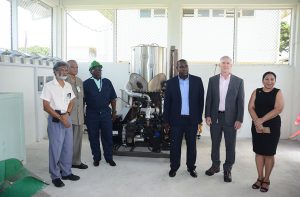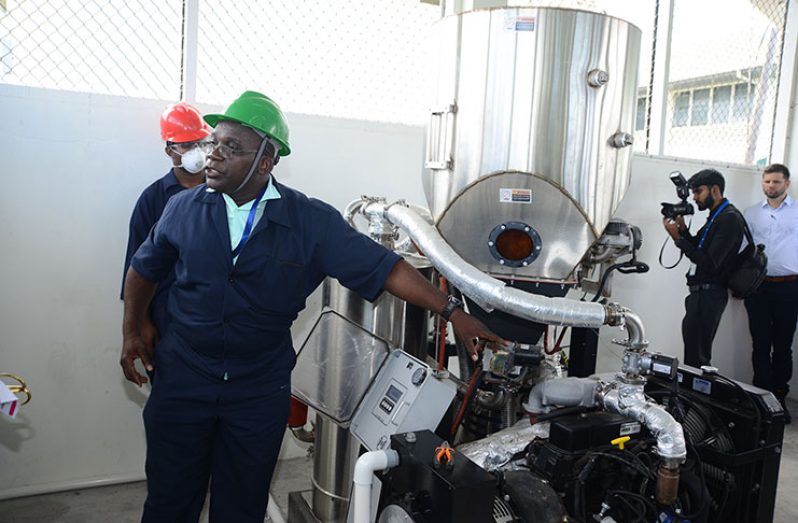…aimed at producing 10-12kW of clean energy
THE University of Guyana (UG) is leading the way in the development of eco-friendly technology with its launch of a bioenergy gasifier which will provide clean, renewable energy to the university through the use of biomass materials.
These materials include wood, grass pellets, coconut shells, rice-hull pellets and other biomass sources which can be used to produce electricity and biochar, a charcoal-like substance used as a soil amendment.
The launch was hosted on Monday at the Faculty of Agriculture and Forestry at the Turkeyen Campus where students have been pursuing courses dealing with the maintenance and enhancement of soil fertility.
The project was partially funded by ExxonMobil at a cost of G$4M; a grant from the Guyana Geology and Mines Commission (GGMC) at G$2M and Progress in Education for Sustainability and Development Opportunities for Aquaculture in the Caribbean (PESCADO) funds.
Researcher in the Faculty of Agriculture and Forestry and project team leader, Dr. Lawrence Lewis explained that the project was birthed out of an opportunity given to students to restore and rehabilitate mined-out areas.

When the group of students began growing trees, they acquired a lot of biomass because the species of tree required much pruning. As such the group then built two pyrolysis kilns to pyrolyse – burn inversely and without oxygen— the biochar which produces syngas.
It led them to the idea of acquiring a bioenergy gasifier which has the capacity to produce electricity; 10-12kW of clean energy from this gas.
The faculty then sought support from its University of Guyana Science and Technology Project (UGSTP) to acquire the bioenergy gasifier machine designed by Dr. Lewis and team. If placed within certain mined-out communities where there is high content of carbonaceous materials, it has the opportunity to improve hinterland agriculture and create employment opportunities while restoring degraded areas.
“This project is aimed at helping communities to be energy efficient, food sufficient and at the same time restoring our trees in Guyana,” Dr. Lewis said.
The project is over two years in the making and will now begin its test and application phase over the next 12 months. Soon, the bioenergy gasifier at the university will provide clean and renewable energy to the Faculty of Agriculture and Forestry from biomass found on campus thereby enabling a significant reduction in the University’s electricity bill.
Meanwhile, the biochar produced will be used as a soil ameliorant and can aid Guyana in its international commitment to mitigate climate change by storing carbon in the soil in a stable form.
The gasifier will also be used to train stakeholders in organic agriculture and power generation and students in bioenergy technology.
Making remarks on behalf of the international oil company was Country Manager of ExxonMobil Guyana, Rod Henson who stated that these are the types of innovative initiatives ExxonMobil is eager to support.
“This is one of the many investments in new technologies with the potential to increase energy supplies, reduce emissions and improve overall efficiencies and those are the things we want to do.”
Henson said that the oil company has worked with dozens of leading universities globally to find solutions to the world’s energy demand and Guyana is leading by example on how creativity can help to minimise waste.
Outgoing Dean of the Faculty of Agriculture and Forestry, Owen Bovell stated that the faculty is grateful for the contributions made to the project which will build national capacity in the areas of biochar and bioenergy.
Bovell stated too that the project will help reduce the carbon footprint at the university and the country and will spur topical discussions on the issues of climate change, the Low Carbon Development Strategy (LCDS) and the Green State Development Strategy (GSDS).
Speaking, too, Chairman of the UG Council, Major General (Rtd), Joseph Singh stated that the university is moving in the right direction in terms of the application of theoretical knowledge. He said that the project launch sends a message to the country about the importance which must be placed on reusing and recycling waste for the benefit of the environment.
The project’s technical team led by Dr. Lewis and Dean Bovell also received support from Verlyn Klass of the Faculty of Engineering and Technology and Philanthropy, Alumni and Civic Engagement (PACE).




.png)









